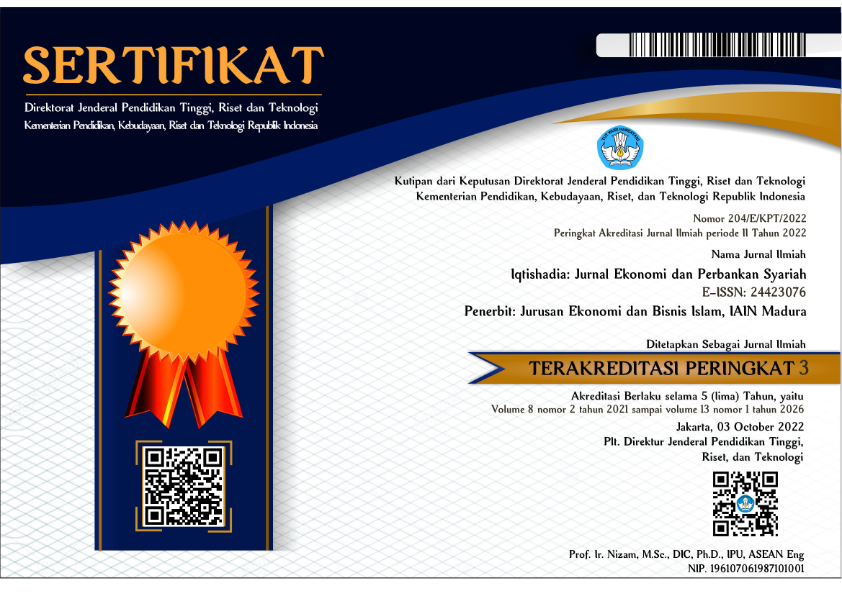Peran Sosial Finance Baitul Maal Wat Tamwil (BMT) dalam Menumbuhkan Keuangan Inklusif Studi pada BMT di Tulungagung dan Blitar
 Abstract views: 1001
,
Abstract views: 1001
,
 PDF downloads: 758
PDF downloads: 758
Abstract
Baitul Maal wat Tamwil has two directions, namely managing business and social affairs. The basic problem for BMT is that the management of social funds in BMT has not been maximized. This is indicated by the distribution of charity social funds. Based on these problems, this paper intends to explore how the implementation and role of BMT social finance in growing financial inclusion?. The method used is a qualitative type and descriptive approach. The results of this paper are first, the implementation of social finance are source of fund’s social finance management and distribution. Source of fund’s social finance are in the form of zakat, infaq, social funds, and distribution of social finance are social assistance, scholarship and qardul hasan financing. Second, the role of Baitul Maal wat Tamwil Pahlawan Tulungagung's social finance role in fostering financial inclusion, among others in the form of Qardh al-Hasan financing and other direct assistance. Direct assistance has no impact on savings opportunities. The role of social finance in growing financial inclusion in the BMT Podo Joyo Blitar includes, among others, the financing of Qardh al-Hasan and assistance for orphans in the form of savings accounts as well as from assistance for widows.
Downloads
References
Akyuwen, Roberto, and Caroline Mangowal. “Komparasi Peningkatan Inklusi Keuangan Dan Indikator Pembangunan Di Indonesia.” MODUS 30, no. 1 (n.d.): 96–109.
———. “Komparasi Peningkatan Inklusi Keuangan dan Indikator Pembangunan di Indonesia.” MODUS 30, no. 1 (96 109AD): 14.
Alam, Nafis, and Syed Aun R. Rizvi, eds. Islamic Banking Growth, Stability and Inclusion. Switzerland: Palgrave Macmillan, 2017.
Ascarya. Micro Level Models of Integrated Islamic Commercial and Social Finance in Indonesia, 2018.
Aziz bin Baz, Syaikh Abdul. Zakat. Translated by Ummu Abdillah al-Buthoniyah, 2009. http://www.raudhatulmuhibbin.org.
Azizah, Rana Ayu, and Noven Suprayogi. “Analisis Keoptimalan Fungsi Baitul Maal Pada Lembaga Keuangan Mikro Islam.” JESTT 1, no. 12 (2014): 841–852.
Bahri S., Andi. “Zakat Sebagai Instrumen Pembangunan Ekonomi Kesejahteraan Ummat.” Li Falah Jurnal Studi Ekonomi dan Bisnis Islam 1, no. 2 (2016).
Bank Indonesia. Pengelolaan Zakat Yang Efektif: Konsep Dan Praktik Di Berbagai Negara. Jakarta: Bank Indonesia dan UII, 2016.
———. Wakaf: Pengaturan Dan Tata Kelola Yang Efektif. Jakarta: Bank Indonesia dan Universitas Airlanggga, 2016.
Bashori, M Anwar. Mendorong Pengembangan Islamic Social Finance Dalam Rangkat Mewujudkan Masyarakat Sejahtera. Bank Indonesia. Indonesia, 2017.
Bayinah, Ai Nur. “Role of Zakat as Social Finance Catalyst to Islamic Banking and Economic Growth.” International Journal of Zakat 2, no. 2 (2017): 55–70.
Baznas. Outlook Zakat Indonesia 2018. Jakarta: Pusat Kajian Strategis Baznas, 2017.
Cornée, Simon, Marc Jegers, and Ariane Szafarz. “A Theory of Social Finance.” Center for Research in Economics and Management (2018): 53.
Dakhoir, Ahmad. “Reactualization of The Islamic Social Finance System of Saprah Amal in Banjar Community Indonesia.” Journal of Legal, Ethical and Regulatory System 21, no. 4 (2018): 1–5.
Damanhur, and Nurainiah. “Analisis Pengaruh Bantuan Zakat Terhadap Tingkat Kesejahteraan Masyarakat Kabupaten Aceh Utara.” Jurnal Visioner & Strategis 5, no. 2 (2016): 71–82.
Fadlan, Fadlan. “KONSEP PEMBANGUNAN EKONOMI BERBASIS ISLAM (Sebuah Upaya Pembangunan Ekonomi Indonesia yang Adil, Makmur, dan Sejahtera).” Al-Ihkam: Jurnal Hukum & Pranata Sosial 5, no. 2 (2012): 257–274.
Geobey, Sean, Frances R Westley, and Olaf Weber. “Enabling Social Innovation through Developmental Social Finance.” Journal of Social Entrepreneurship 3, no. 2 (2012): 151–165.
Gurning, Herfita Rizki Hasanah, and Haroni Doli Hamoraon Ritonga. “Analisis Tingkat Kesadaran Masyarakat Kecamatan Medan Baru Dalam Membayar Zakat.” Jurnal Ekonomi da Keuangan 3, no. 7 (n.d.).
Hangl, Christa. “A Literature Review About The Landscape of Social Finance.” ACRN Journal of Finance and Risk Perspective 3, no. 4 (2014): 64–98.
Harji, Karim, and Tessa Hebb. “Impact Investing for Social Finance.” ANSER Conference (2010): 1–20.
Jones, John. “Social Finance : Commerce and Community in Developing Countries.” International Journal of Social Economics 37, no. 6 (2010): 415–426.
Lubis, Fauzi Arif. “Peranan BMT Dalam Pemberdayaan Ekonomi Nasabah Di Kecamatan Berastagi-Kabanjahe Kabupaten Karo ( Studi Kasus Bmt Mitra Simalem Al-Karomah ).” Human Falah 3, no. 2 (2016): 271–295.
Lujja, Sulaiman, Mustafa Omar Mohammad, Rusni Bt. Hassan, and Umar A. Oseni. “The Feasibility of Adopting Islamic Banking System under the Existing Laws in Uganda.” International Journal of Islamic and Middle Eastern Finance and Management 9, no. 3 (2016): 417–434.
Martowardojo, Agus D.W. “Integrating Islamic Commercial and Social Finance to Strengthen Financial System Stability.” International Seminar and the 2nd JIMD (2016): 1–8.
Meutia, I. Shari‟ah Enterprise Theory Sebagai Dasar Pengungkapan Tanggungjawab Sosial Bank Syariah. Universitas Brawijaya Malang, 2009.
Mitic, Petar, and Slobodan Rakic. Social Finance and Social Banking- a Path towards a More Sustainable Future. Serbia, n.d.
Mohamad, Saadiah. “Is Islamic Finance , Social Finance ?” Journal of Emerging Economies and Islamic Research 2, no. 2 (2012): 1–5.
Nengsih, Novia. “Peran Perbankan Syariah Dalam Mengimplementasikan Keuangan Inklusif Di Indonesia.” Etikonomi 14, no. 2 (2015): 221–240.
Nicholls, Alex, Rob Paton, and Jed Emerson. Social Finance. Oxford Scholarship Online, 2015.
Nofrianto, and Suardi. “Bank Syariah Dan Pemberdayaan Coorporate Social Responsibility: Peran Dan Fungsi Bank Syariah Perspektif Filosofi Sosio - Ekonomi.” Akademika 20, no. 02 (2015): 261–276.
Novarela, Dori, and Indah Mulia Sari. “Pelaporan Corporate Social Responsibility Perbankan Syariah Dalam Perspektif Syariah Enterprise Theory.” Jurnal Akuntansi dan Keuangan Islam 2, no. 2 (2015): 145–160.
Nugroho, Ari, and Evi Yulia Purwanti. Determinan Inklusi Keuangan Di Indonesia. Semarang, 2014.
Nurhasanah, Siti. “Akuntabilitas Laporan Keuangan Lembaga Amil Zakat Dalam Memaksimalkan Potensi Zakat.” Jurnal Ilmu Akuntansi 11, no. 2 (2018).
Obaidullah, Mohammed, and Nasim Shah Shirazi. “Islamic Social Finance Report 1436H (2015)” (2015): 164.
Othman, Rohana, Azlan Md Thani, and Erlane K Ghani. “Determinants Of Islamic Social Reporting Among Top Shariah -Approved Companies In Bursa Malaysia.” Research Journal of International Studies 12, no. 12 (2009): 4–20.
Prastowo. “Analisis Regional Keuangan Inklusi Perbankan Syariah Terhadap Ketimpangan Pendapatan Di Indonesia.” Jurnal Ekonomi & Keuangan Islam 4, no. 1 (2018): 51–57.
Ridlo, Ali. “Zakat Dalam Perspektif Ekonomi Islam.” Jurnal Al - ’Adl 7, no. 1 (2014): 19.
Rizzi, Francesco, Chiara Pellegrini, and Massimo Battaglia. “The Structuring of Social Fi Nance : Emerging Approaches for Supporting Environmentally and Socially Impactful Projects.” Journal of Cleaner Production 170 (2018): 805–817.
Romdhoni, Abdul Haris. “Zakat Dalam Mendorong Pertumbuhan Ekonomi Dan Pengentasan Kemiskinan.” Jurnal Ilmiah Ekonomi Islam 03, no. 01 (2017): 41–51.
Sanjaya, I Made, and Nursechafia. “Inklusi Keuangan dan Pertumbuhan Inklusif: Analisis Antar Provinsi di Indonesia.” Buletin Ekonomi Moneter dan Perbankan 18, no. 3 (2016): 26.
———. “Inklusi Keuangan Dan Pertumbuhan Inklusif: Analisis Antar Provinsi Di Indonesia.” Buletin Ekonomi Moneter dan Perbankan 18, no. 3 (2016): 281–306.
Susilowati, Lantip. “Model Strategi Tumbuh Dan Bertahan Pada Pengelolaan Baitul Maal Wat Tamwil (BMT) Di Kabupaten Tulungagung Dan Ponorogo.” IQTISHADIA: Jurnal Ekonomi & Perbankan Syariah 5, no. 2 (December 28, 2018): 163.
Tim Penyusun Direktorat Pemberdayaan Zakat. Zakat Community Development ; Model Pengembangan Zakat. Direktorat Jenderal Bimbingan Masyarakat Islam, Direktorat Pemberdayaan Zakat, 2013.
Weber, O’, and Y. Duan. “Social Finance and Banking. Socially Responsible Finance and Investing: Financial Institutions, Corporations, Investors, and Activists” (2012): 160 180.
Weber, Olaf, and Sven Remer, eds. Social Banks and the Future of Sustainable Finance. 1st ed. London and New York: Routledge, 2011. Accessed July 30, 2019. https://www.taylorfrancis.com/books/9780203827871.
Yaaba, Baba N, and Abubakar Mika’ilu. “Financial Inclusion and Deepening in Nigeria: The Contribution of Jaiz Bank.” SHARE Jurnal Ekonomi dan Keuangan Islam 7, no. 2 (2018): 95–115.
PERATURAN PERUNDANG-UNDANGAN
Fatwa Dewan Syariah Nasional Nomor 19/DSN-MUI/IV/2001 tentang al-Qardh
Lampiran Peraturan Presiden Republik Indonesia Nomor 82 Tahun 2016 Tentang Strategi Nasional Keuangan Inklusif
Undang-Undang Nomor 23 Tahun 2011, Tentang Pengelolaan Zakat
Undang-Undang Nomor 40 Tahun 2007 Tentang Perseroan Terbatas
The journal operates an Open Access policy under a Creative Commons Non-Commercial Share-Alike license. All articles published Open Access will be immediately and permanently free for everyone to read and download.
• Creative Commons Attribution-NonCommercial (CC-BY-NC)

Iqtishadia: Jurnal Ekonomi dan Perbankan Syariah by http://ejournal.iainmadura.ac.id/index.php/iqtishadia is licensed under a Creative Commons Attribution-NonCommercial 4.0 International License.
Based on a work at http://ejournal.iainmadura.ac.id.


























